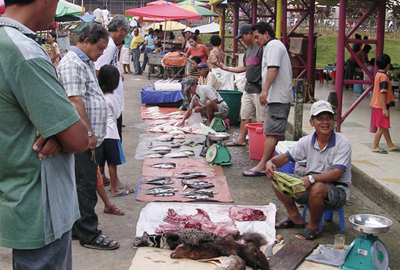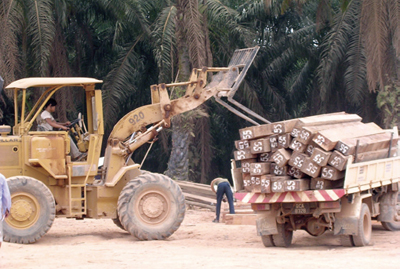Project Leader:SODA, Ryoji (Graduate School of Literature and Human Sciences, Osaka City University)
Collaborators: FUJITA, Motoko (Center for Southeast Asian Studies, Kyoto University)
UBUKATA, Fumikazu (Graduate School of Environmental Science, Okayama University)
ENDO, Tamaki (Faculty of Economics, Saitama University)
SAMEJIMA, Hiromitsu (Center for Southeast Asian Studies, Kyoto University)
SADAMICHI, Yucho (Research Institute of Science for Safety and Sustainability,
National Institute of Advanced Industrial Science and Technology)
ISHIKAWA, Noboru (Center for Southeast Asian Studies, Kyoto University)
Term:2011-2012
Outline of Research:

An inland market town in Borneo. Although selling wild animals is prohibited by the law, some kinds of meats are still locally-distributed.
This study examines the interrelationships between human and equatorial high-biomass environment, by analyzing biological resource generated commodity chains at local/regional/global levels. Project members with different academic backgrounds accumulate case studies on the flows of high-biomass products such as timber, mammal meat, bird’s nest, rattan, gutta-percha, rubber, oil palm, and acacia, each of which would make clear the way of equatorial resource utilization and its commoditization. Integrating those case studies, we aim to create a new methodology of multi-scale area studies of human-nature interactions.
Description:

Reloading of timber. Timber from Indonesian Borneo are temporarilly deposited in borderland logponds to be exported to Malaysia, and farther to Japan and other countries.
The purpose of this study is to construct new multidisciplinary global area studies by examining the process of equatorial biomass application from production to consumption at various spatiotemporal scales. Instead of conventional studies that focused on commodity chains from macro perspectives, our study is more multidimensional including perspectives of disturbance ecology, lifecycle assessment, anthropology, and area studies. This is in order to make clear the interactions between people and high-biomass environment in tropical regions.
In this study, each member conducts case studies to analyze the commoditization of high-biomass generated products, setting up effective unit of spatiotemporal scales based on the method of each academic discipline. The subsequently accumulated case studies will then be theoretically integrated by using methodologies of geography and historical science that will help articulate studies with different time/spatial scales. This will be an experimental attempt at creating a new type of integration between the humanities and science.
Looking at the flow mechanisms of tropical high-biomass products and inter-regional relationships through commodity chains, we will try to deconstruct conventional area studies which are bound to a specific research site and present a new model of ‘interdisciplinary and trans-regional’ area studies with an equatorial perspective.
